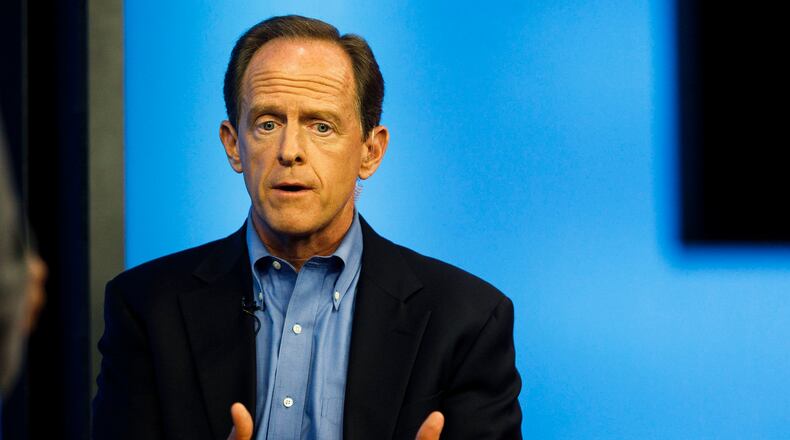U.S. Sen. Pat Toomey, R-Pa., defended the Senate health care bill’s curbing of Medicaid spending by calling Medicaid the single-biggest driver of the federal budget deficit.
Toomey said the proposed cuts to Medicaid spending would slow the growth of entitlement programs, which he claimed are “driving the fiscal train wreck we’re on” in a “Morning Joe” interview Monday.
Medicaid “is the one that is growing most rapidly, and is contributing to 70 percent of our budget deficit right now. It’s the one that is in our lap because of Obamacare,” Toomey said.
Is Medicaid the primary culprit behind the federal budget deficit? We found Toomey is playing parlor games with budget figures.
‘Misleading’ numbers
When we asked Toomey’s office for evidence that Medicaid is contributing up to 70 percent of the deficit, it pointed out that spending on Medicaid is equal to 70 percent of the deficit. It divided projections on Medicaid spending in 2017 ($389 billion) by the estimated budget deficit ($559 billions) to get 69.6 percent. The figures come from the nonpartisan Congressional Budget Office.
The problem is, that same calculation can be made with any federal program to reach a different conclusion.
Using Toomey’s logic, Dean Baker, the co-director of the left-leaning Center for Economic and Policy Research, said that “since we will spend $634 billion on the military this year, defense spending is more than 100 percent responsible for the deficit.”
“No one would take this argument seriously about the military and the deficit,” Baker said, “nor should they take his argument seriously about Medicaid and the deficit.”
Defense spending would account for 113 percent of the deficit, nondefense discretionary spending 103 percent, and Medicare 101 percent if we were to divide spending by the deficit in the same way Toomey did.
Toomey’s office made a more nuanced argument about its calculation, though, discussing Medicaid in the context of entitlements and net spending.
“Unlike the other entitlement programs, Medicaid has no dedicated revenue stream, so it is taken solely out of general revenue or the deficit. Therefore, when direct revenue streams are taken into account, Medicaid spends the most on net,” said Kasia Mulligan, the communications director for Toomey.
Medicaid looks worse compared with Medicare or Social Security because its federal share is wholly financed by general revenue, whereas Medicare is partially covered by payroll taxes and premiums, said Diane Rowland, executive vice president at the Kaiser Family Foundation.
General revenue, however, still helps finance Medicare and Social Security. Discounting payroll taxes and premiums, Medicare represents 34 percent of the deficit and Social Security 17 percent (using Toomey’s rationale). This would make Medicaid the biggest contributor within entitlements, but entitlements aren’t the only contributors to the deficit.
Defense spending is also wholly financed by general revenue and surpasses Medicaid in the amount it contributes to the deficit.
“There’s no way to say that a dollar spent on Medicaid is any more responsible for the deficit than a dollar spent on defense or discretionary spending or anything else the government does,” said Ben Sommers, a health policy and economics professor at Harvard University.
Is the Affordable Care Act to blame?
Toomey blamed Medicaid spending on the Affordable Care Act, but the law isn’t entirely responsible for Medicaid’s entire costs.
Elderly people and those with disabilities account for two-thirds of Medicaid spending, and low-income children account for one-fifth; two groups that were unaffected by the Medicaid expansion introduced by the Affordable Care Act, Rowland said.
Medicaid spending has been growing faster than Medicare or Social Security in recent years, as Toomey said, but per-capita costs are actually growing at a slower rate than for Medicare or private insurance. An increased number of people covered by Medicaid is responsible for higher costs.
The cost of this increased coverage was covered by taxes imposed by the Affordable Care Act that added to the general revenue so as not to grow the deficit.
Our rating
Toomey said Medicaid is contributing to 70 percent of our budget deficit.
The truth is, Medicaid spending annually is about 70 percent of the size of the federal budget deficit. The same logic, if applied to defense spending, would mean defense spending contributes more than 100 percent to the deficit. Experts say both comparisons are flawed and misleading.
Blaming the Affordable Care Act for the rise in Medicaid spending isn’t entirely right either, as the majority of Medicaid spending was already in place before the law, and taxes were imposed to offset the Medicaid expansion’s strain on the deficit.
Toomey’s claim contains an element of truth but ignores critical facts that would give a different impression.
We rate this statement Mostly False.
Medicaid “is contributing to 70 percent of our budget deficit right now. It’s the one that is in our lap because of Obamacare.”
— Pat Toomey on Monday, July 10, 2017, on “Morning Joe”
About the Author
Keep Reading
The Latest
Featured


